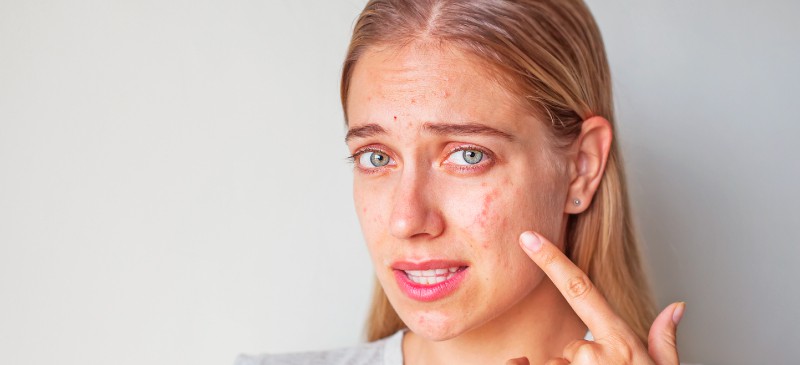
Some dermatologists refer to nodular acne as simply “severe acne” or as nodulocystic acne. Oftentimes these nodules can last a long time below the skin’s surface, and usually they do not form whiteheads, blackheads or are able to be “popped.”
This means that the pus remains trapped inside the skin, which leads to redness, discomfort and swelling. The nodules can sometimes remain under the skin for weeks or even months.
If you’ve tried other remedies for acne without success, such as over-the-counter topical treatments, you’re probably wondering how to get rid of nodular acne. The truth is, this type of skin problem can be difficult to treat, but if you address the problem holistically and also speak with your doctor about treatment options if necessary, you’ll likely get your breakouts under control.
What Is Nodular Acne?
Nodular acne is a type of severe acne that is often painful. It’s characterized by having large, deep, inflamed pimples that are called acne nodules.
A nodule is defined as “a swelling or aggregation of cells in the body, especially an abnormal one.” Nodules form below the skin’s surface when trapped pus hardens.
People who are affected by nodular acne most often develop breakouts on the face (especially the jawline, chin and neck), back and sometimes the chest.
This type of acne is most common among teen boys and young adults, especially young males. Women can develop it too, especially if it’s tied to hormonal acne.
Symptoms and Causes
Something that sets nodular acne apart from other types of acne is how the pimples develop and how long they last.
Does nodular acne have pus? The pimples do contain pus inside, due to an infection forming within the pore, but you won’t be able to see it most of the time or remove it easily on your own.
If you are to touch a nodule it will likely feel painful and sometimes even hard, what some refer to as a “knot” below the skin. These types of pimples can either be red, slightly purple or brown (like a scar) — sometimes even skin-colored.
Nodular Acne vs. Cystic Acne:
Nodular acne and cystic acne have many things in common, and sometimes the terms are even used interchangeably. Both are severe types of acne that form deep breakouts underneath the surface of the skin.
One difference between the two is that cysts are softer than nodules and more likely to have noticeable pus inside. Not all cystic acne pimples form whiteheads that open, but some do — and more often than nodules do.
What causes nodular acne?
Factors that are thought to contribute to nodular acne include:
- Overactive sebaceous glands (also oil glands that produce sebum). Sometimes this is due to elevated androgen levels, which are reproductive hormones that can increase how much oil the skin produces. When the skin becomes overly oily it can lead to pores clogging and bacteria getting trapped inside, which triggers a pimple to form.
- Another reason that pores become clogged is due to buildup of dead cells within the pores, which also traps bacteria inside. This may be due to poor hygiene, such as not washing your face often or from makeup.
- Genetics also seems to play a role, since severe acne tends to run in families.
- A woman’s menstrual cycle can also cause flare-ups in acne. Some women break out, in some cases severely, prior to the periods.
- Hormones can also be involved, such estrogen, progesterone and testosterone. Levels of these hormones may fluctuate due to issues like stress, hormonal birth control treatments, rapid changes in weight, a big change in one’s exercise routine, or use of certain medications that may alter cortisol levels or other hormones.
How to Treat It
Does nodular acne go away? It likely won’t clear up on its own unless you address the underlying causes, and unfortunately over-the-counter products alone don’t always resolve this tissue.
However, in some cases, someone may outgrow the problem if it’s related to something like puberty, a temporary hormonal imbalance or stress.
READ RELATED: DIY Sea Salt Spray
According to experts, here’s how to get rid of nodular acne:
1. Clean Your Skin Gently
First and foremost, focus on taking steps to get rid of pimples in general. That means practicing good hygiene and cleaning your skin regularly.
This helps keep oil levels on your skin in balance, which can reduce clogged pores and buildup of bacteria.
Be careful not to overly apply acne products to your skin (like salicylic acid and benzoyl peroxide), which can irritating and drying when used too frequently, particularly if you spend time in the sun after. Rubbing alcohol can also have this effect.
These are unlikely to resolve nodular acne since they only work to clean the skin’s surface.
Here are some tips for keeping your skin clean:
- Wash with a gentle cleanser, such as one with probiotics, twice daily.
- Apply a lightweight moisturizer to your skin that’s free of fragrances and chemicals.
- Get some sunlight exposure, but avoid getting burned.
- Remove all makeup before going to sleep.
- Consider using toners and clay masks weekly, such as witch hazel or bentonite clay.
- Wash your pillowcases often.
- Make sure you wear clean makeup, and keep it minimal to avoid clogging pores.
2. Work on Balancing Your Homes
Balancing your hormones comes down to making lifestyle changes like eating a nourishing diet, managing stress, exercising appropriately and getting enough sleep.
Consume plenty of antioxidants, probiotics, healthy fats and anti-inflammatory foods that help support hormone balance, immune function and overall healthy skin. It can also help to remove highly processed foods or certain food allergens from your diet, which supports gut health.
Exercising regularly to improve overall immune function and getting enough sleep — about seven to nine hours per night for most adults — can also help improve your general health and hormone balance. Keep in mind that overtraining may lead to hormone changes, such as by increasing androgens and cortisol, while sleep deprivation can also elevate stress hormone levels.
3. Don’t Try to Pop the Pimples
It’s usually not possible to pop these nodules on your own, so it’s best not to try and keep your hands off of them. If you do try to squeeze and pick at them you may cause bleeding below the skin and scarring.
4. Ice Painful Pimples
How do you treat acne nodules at home? While targeting the underlying cause is important (such as high androgen levels), you can also reduce the pain associated with acne nodules by applying ice or an ice pack.
Wrap some ice in a cloth, and gently press against the breakout a few times a day.
Risks and Side Effects
If the treatments above don’t seem to help, consider visiting a dermatologist for help. If your breakouts are severe and very uncomfortable, your doctor might recommend that you try prescription medications.
A dermatologist can determine if a topical treatment, an antibiotic or cortisone shots (which can reduce inflammation surrounding nodules) can help. Each of these treatments has potential side effects, however sometimes they are very effective.
Some possible treatment options to discuss with your doctor that can control bacteria and oil and also reduce scarring include:
- Topicals like retinoids or Isotretinoin (formerly known as Accutane)
- Chemical peels
- Laser therapies
- Cortisone injections
If you do choose to use antibiotics to control your breakouts, follow directions carefully. These drugs should only taken for a short period of time to target underlying bacteria, but they aren’t long-term solutions since they have side effects.
Conclusion
- Nodular acne is a type of severe acne that causes deep, inflamed pimples that are often painful.
- These zits normally don’t form heads and can’t be popped. They can sometimes last for weeks or even months.
- The causes are commonly related to hormonal issues, puberty, pregnancy or sometimes stress. It also runs in families.
- How do you get rid of acne nodules? Clean your skin, don’t pick or pop, ice pimples, and address hormone-related causes. Then speak to your doctor about potential treatments like lasers and topical solutions.
Source: Dr. Axe






